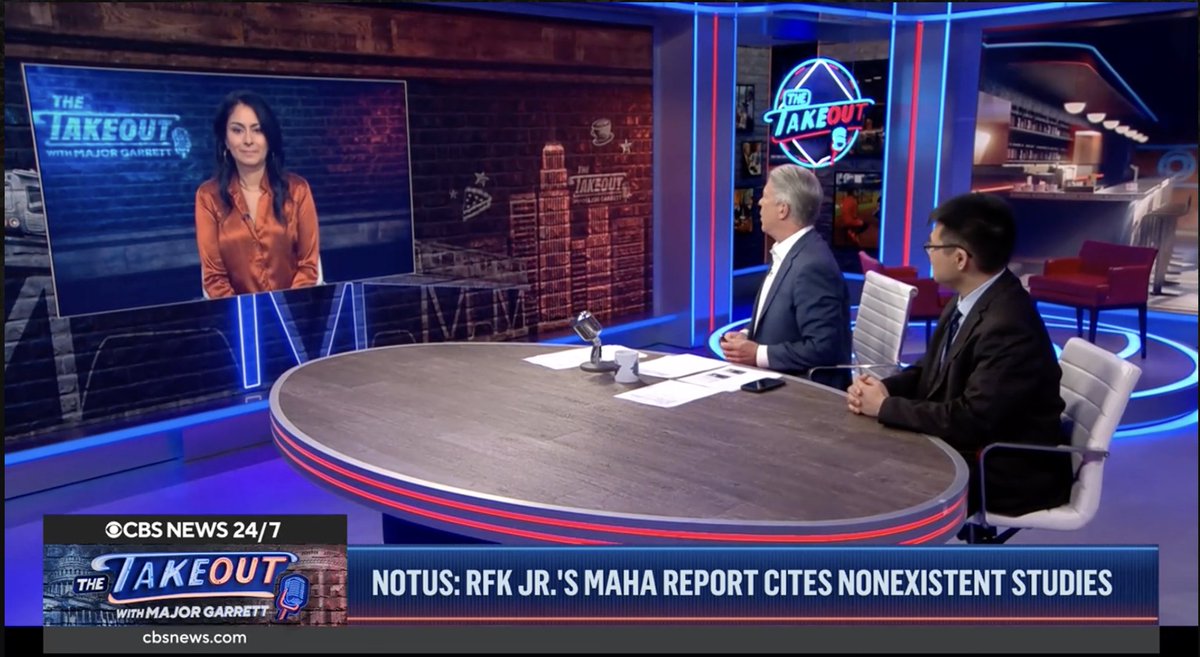1/ For the first time in decades, US pediatricians have released their own vaccine schedule, separate from the CDC.
Why? Because they no longer trust the government’s process.
Here’s what parents need to know. 🧵
on @CBSEveningNews with @jdickerson
Why? Because they no longer trust the government’s process.
Here’s what parents need to know. 🧵
on @CBSEveningNews with @jdickerson
2/ Earlier this year, the CDC’s vaccine advisory committee was overhauled.
All 17 experts were dismissed & replaced with just 7 appointees—several with a history of spreading vaccine misinformation or skepticism.
All 17 experts were dismissed & replaced with just 7 appointees—several with a history of spreading vaccine misinformation or skepticism.
3/ The Vaccine Integrity Project was established to fill the void & brings together many of top vaccine experts.
Today, the Vaccine Integrity Project reviewed the most up-to-date science on the safety & effectiveness of flu, RSV & COVID vaccines.
Today, the Vaccine Integrity Project reviewed the most up-to-date science on the safety & effectiveness of flu, RSV & COVID vaccines.
4/ The Vaccine Integrity Project's scientific review is informing the @AmerAcadPeds' recommendations & those of other professional medical societies.
The Vaccine Integrity Project has taken NO $$$ from pharma companies.
The Vaccine Integrity Project has taken NO $$$ from pharma companies.
5/ The American Academy of Pediatrics @AmerAcadPeds, which represents 67,000 pediatricians nationwide, says: parents deserve guidance rooted in science, not politics.
Their new schedule covers all childhood vaccines, with updates for RSV, flu, & COVID.
publications.aap.org/redbook/resour…
Their new schedule covers all childhood vaccines, with updates for RSV, flu, & COVID.
publications.aap.org/redbook/resour…
6/ Let’s start with RSV.
RSV is the leading cause of hospitalization in babies under 1 year. 🏥
tiny airways + immature immune systems
➡️ greater risk of severe disease
RSV is the leading cause of hospitalization in babies under 1 year. 🏥
tiny airways + immature immune systems
➡️ greater risk of severe disease
7/ The @AmerAcadPeds recommends protecting babies against RSV in 1 of 2 ways:
💉Mom🤰gets the RSV vaccine during pregnancy → passes antibodies to baby
💉 Baby👶 receives an RSV shot (monoclonal antibody) after birth
💉Mom🤰gets the RSV vaccine during pregnancy → passes antibodies to baby
💉 Baby👶 receives an RSV shot (monoclonal antibody) after birth
8/ For flu, the recommendation hasn’t changed:
every child ≥6 months should get a flu shot each year.
Last season, 267 children died from flu—the highest number for a non-pandemic year in decades.
Almost half were otherwise healthy kids.
every child ≥6 months should get a flu shot each year.
Last season, 267 children died from flu—the highest number for a non-pandemic year in decades.
Almost half were otherwise healthy kids.
9/ Annual flu vaccination helps not only children, but also the community:
🔹keeping kids in school
🔹protecting high-risk relatives
🔹preventing strain on hospitals during winter virus season
🔹keeping kids in school
🔹protecting high-risk relatives
🔹preventing strain on hospitals during winter virus season
10/ Now to COVID.
This is where pediatricians diverge most sharply from the CDC.
The CDC no longer recommends COVID vaccination for healthy children.
Pediatricians strongly disagree.
This is where pediatricians diverge most sharply from the CDC.
The CDC no longer recommends COVID vaccination for healthy children.
Pediatricians strongly disagree.
11/ The @AmerAcadPeds recommends COVID vaccination for ALL infants & toddlers ages 6 months to 2 years old, since this age group is at the highest risk for hospitalization & complications.
12/ After age 2, decisions about boosters can be made with your pediatrician based on risk.
But the bottom line from pediatricians: a child’s first encounter with COVID should be the vaccine—not the virus.
But the bottom line from pediatricians: a child’s first encounter with COVID should be the vaccine—not the virus.
13/ What about routine childhood vaccines like MMR, polio, & DTaP?
These remain essential.
But coverage is slipping.
Nationwide, kindergarten measles vaccination rates dropped to ~92% last year.
These remain essential.
But coverage is slipping.
Nationwide, kindergarten measles vaccination rates dropped to ~92% last year.
14/ That may sound high, but measles is so contagious you need ~95% coverage to prevent outbreaks.
Sure enough, 2025 has been the worst measles year in over 30 years—with a major outbreak in Texas spreading to other states.
Sure enough, 2025 has been the worst measles year in over 30 years—with a major outbreak in Texas spreading to other states.
15/ These “old” vaccines are still the foundation of keeping kids safe at school.
Falling behind puts whole communities at risk.
Falling behind puts whole communities at risk.
• • •
Missing some Tweet in this thread? You can try to
force a refresh






